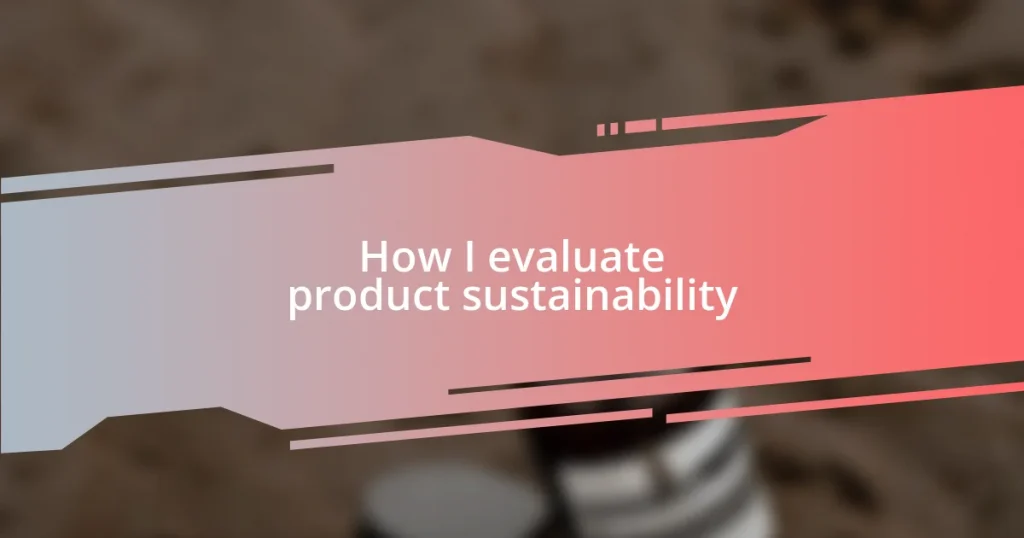Key takeaways:
- The rapid advancement in battery technology is enhancing EV range and reducing charging times, leading to increased adoption.
- Leading models like Tesla Model 3, Ford Mustang Mach-E, and Hyundai Ioniq 5 highlight innovative features and user experience, blending performance with sustainability.
- Future developments in solid-state batteries, vehicle-to-grid technology, and autonomous driving promise to revolutionize the electric vehicle landscape.

Current electric vehicle trends
I’ve noticed that the latest trend in electric vehicles (EVs) is the rapid advancement in battery technology. It’s fascinating how manufacturers are focusing on increasing range and reducing charging time. Just the other day, a friend of mine shared her excitement about her new EV, which can go over 300 miles on a single charge. Isn’t it incredible how far we’ve come?
Another significant trend I’ve observed is the growing emphasis on sustainability beyond just the vehicles themselves. Many companies are now prioritizing eco-friendly materials and sustainable production processes. This shift really resonates with me; I feel better about making green choices when I know the entire lifecycle of a product is taken into account. Has anyone else experienced that moment of clarity when you see brands genuinely committing to sustainability?
Finally, I can’t help but mention the surge in EV adoption due to government incentives and charging infrastructure improvements. It’s like watching a transformative wave sweep through the automotive industry. I remember the excitement I felt when a new charging station opened near my home. It made switching to an electric vehicle feel not just feasible but a smart lifestyle choice! How does that kind of accessibility change your perception of EVs?

Leading electric vehicle models
The electric vehicle market is buzzing with standout models that capture attention for their innovation and performance. For instance, the Tesla Model 3 is often highlighted for its impressive range, sleek design, and cutting-edge technology. I remember the first time I got inside one—it felt like stepping into the future with all its digital interfaces.
Another noteworthy contender is the Ford Mustang Mach-E, which blends the iconic Mustang spirit with modern EV capabilities. I was blown away when I took a ride in one! The way it accelerates and handles on the road truly maintains that fun driving experience while being eco-friendly. It’s exciting to see traditional brands like Ford embrace the electric future without losing their heritage.
Finally, the Hyundai Ioniq 5 has gained acclaim for its spacious interior and fast charging capabilities. I recently had a chance to test drive it, and the comfort and tech features left me genuinely impressed. It shows that leading models are focusing on user experience alongside performance, making them very appealing choices in the market today.
| Model | Range (miles) | 0-60 mph (seconds) | Charging Time (80% in hours) |
|---|---|---|---|
| Tesla Model 3 | 358 | 3.1 | 1.5 |
| Ford Mustang Mach-E | 300 | 3.5 | 1.0 |
| Hyundai Ioniq 5 | 303 | 5.0 | 1.0 |

Comparative analysis of top brands
The electric vehicle landscape is undeniably diverse, with each brand offering distinct strengths. Tesla continues to dominate the market thanks to its unmatched performance and innovative technology, but brands like Ford and Hyundai are making significant strides that can’t be ignored. I remember feeling a palpable excitement when I first rode in a Ford Mustang Mach-E—its ability to merge classic style with electric efficiency could sway even the most die-hard gas engine enthusiasts.
Here’s a quick comparison of some top brands:
- Tesla Model 3: Known for its range and tech-savvy features; feels like a futuristic experience.
- Ford Mustang Mach-E: Exhilarating performance that sticks closely to the Mustang legacy; it’s thrilling while driving.
- Hyundai Ioniq 5: Offers comfort and practicality, with a dash of cutting-edge design—perfect for family road trips.
As I see it, the competition is fierce, and each brand brings something unique to the table. It’s this variety that makes this phase in the automotive industry thrilling, as driving an electric vehicle now feels like not just embracing a technology, but a lifestyle choice that resonates with my values.

Key features of electric vehicles
Electric vehicles (EVs) come packed with game-changing features that make them really stand out. For instance, regenerative braking is one of my favorite features. It essentially converts kinetic energy back into battery power, enhancing efficiency. I can recall the first time I experienced it; I was amazed at how it made the car feel more responsive. This feature not only increases range but also extends the life of the brake components.
Battery technology has also seen remarkable advancements. Today’s EVs use lithium-ion batteries that offer higher energy densities and faster charging times compared to older models. When I charged my friend’s new EV and saw how quickly it reached 80%, I realized just how far we’ve come. There’s such a sense of convenience knowing that a quick charging stop can get you back on the road in no time.
Moreover, the integration of smart technology is pivotal in the appeal of electric vehicles. Many models now feature advanced driving assistance systems that include adaptive cruise control and lane-keeping assistance. Personally, I find these technologies incredibly comforting, especially during long drives. Have you ever felt that wave of stress wash away when the car smoothly navigates traffic? It makes the journey not just about getting from point A to B, but also about enjoying the ride.

Consumer preferences and feedback
Consumer preferences for electric vehicles are evolving rapidly, reflecting a desire for sustainability without sacrificing performance. I’ve noticed that many drivers prioritize range, with a personal friend opting for an EV almost purely because of its ability to cover long distances on a single charge. Isn’t it fascinating how people are willing to make the switch when they can enjoy both eco-friendliness and practicality?
In discussions with fellow EV enthusiasts, I often hear a shared sentiment about the appeal of innovative technology features. When I took a test drive in a Hyundai Ioniq 5, I was particularly impressed by the intuitive infotainment system and voice command capabilities. It felt like I was in a gadget-filled futuristic space, which is quite an emotional shift from my previous car experiences. Don’t you think that integrating technology enhances not just convenience but also the joy of driving?
Feedback from recent EV drivers highlights the importance of brand perception, too. Many express a distinct attachment to the heritage of brands like Ford, often sharing anecdotes about their loyalty to the Mustang legacy as they transition to the Mustang Mach-E. I can totally relate to that nostalgia; it makes the drive feel more personal. How much do our choices in vehicles reflect our identities and values? That’s a question I think about often, as it underscores the deep connection we have with the cars we choose to drive.

Future developments in electric vehicles
The future of electric vehicles holds exciting possibilities, especially in battery technology. I’m particularly intrigued by the prospect of solid-state batteries. They promise to offer greater energy density and safer operation compared to the current lithium-ion batteries. Can you imagine the thrill of driving hundreds of miles on a single charge? That’s a game-changer for long-distance travel, and I can’t wait to see these innovations become mainstream.
Another area I see significant evolution is in vehicle-to-grid (V2G) technology, which allows EVs to communicate with and even supply energy back to the grid. I once chatted with an engineer working on V2G systems, and he shared how this could not only stabilize power supply but also create an additional income stream for EV owners. Doesn’t it sound appealing to think your vehicle could pay for itself through energy trading? This type of integration with renewable energy sources could redefine our relationship with power consumption.
Lastly, I believe autonomous driving will be a massive leap forward. The idea of sitting back, relaxing, and letting the car drive for me is exhilarating. I remember a road trip where I had to focus intently on navigating through heavy traffic, and the thought of eliminating that stress with self-driving capabilities excites me. What if we could even use that time to enjoy our favorite podcast or catch up on reading? That’s the type of future I envision for electric vehicles—a seamless blend of technology and comfort.















